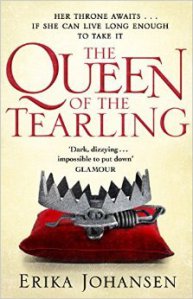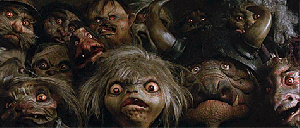 The Shanghai Moon
The Shanghai Moon
by S. J. Rozan
Series: Lydia Chin & Bill Smith, #9
Hardcover, 373 pg.
Minotaur Books, 2010
Read: February 16 – 18, 2016

Oh, man . . . things got away from me and I haven’t been able to reconnect with Lydia or Bill for too long now (14 months between books I think) — I missed them. Thankfully, it took no time at all to get back in the groove.
Speaking of breaks, following the shattering events of Winter and Night, Bill Smith pretty much took a break from everything — including Lydia. She understood that but didn’t like it one bit. So when he does come back into he life early on in this book, she doesn’t exactly welcome him with open arms, and makes him jump through a few hoops to get back into her good graces (but not nearly as many hoops as she intended).
But before we get to that, a one-time mentor and occasional colleague, Joel Pilarsky asks Lydia to help with an investigation. Some jewels have recently been uncovered in China, stolen and theoretically brought to New York to be sold. The client wants Pilarsky to track them down — he suggests that he’ll cover the Jewish jewelry shops that might buy them, and hires Lydia to do the same with Chinese jewelers. What makes these jewels special is that they belonged to Jewish refugees in the 1930’s who fled to Shanghai, and were probably owned by the same person who owned a legendary piece of jewelry from that time — The Shanghai Moon. Not that the client, a lawyer focused the recovery of Holocaust items, bothers to mention The Shanghai Moon (she has a lame excuse for that oversight when Lydia brings it up later).
Yes, I did say Jewish refugees in Shanghai. I felt bad about not knowing anything about that until Lydia confessed it was news to her, too. She’s intrigued by this notion — and the story of the owner of these jewels, much of which is preserved in letters she wrote to her mother after fleeing from Europe and are now part of a collection of Holocaust documents. We get these letters to, and read them with Lydia and slowly we’re drawn in to the saga of this poor woman and the Chinese man she marries while Lydia and Joel search for her heirlooms.
The investigation soon focuses on The Shanghai Moon — and the murders that appear to be connected to this crime. Bill returns to Lydia’s life in time to help with this investigation. Before you know what’s happening, we’re immersed in a mystery that stretches over decades and involves Nazis, Communists, Japanese military, NYC Chinese gangs and much, much more. The threads that connect all these to the jewels and the family tied to them are so many in number and complex in nature, that I wouldn’t try to explain it even if it wouldn’t spoil the book.
I didn’t get as invested in the historical material as Lydia did — but i came close, and I think most readers will, too. If for no other reason than Bill and Lydia do. There’s a history professor that the pair interview for some more context that I’d love to meet again (I can’t imagine how that’d happen) — he’s a fun character that’s much better developed than most characters filling his role would be in detective novels.
I don’t know if I’ve liked Lydia’s mom as much as I did in this book before (or enjoyed her as much) — it took Lydia far too long to understand what her mother was doing throughout the novel, and the growth/change it represented, but I thought it was great. I’m actually looking forward to reading about her in the next novel (I’ve never disliked the character, just have never been that interested in her).
Best of all, as normal, was the banter and other types of conversation between Lydia and Bill. I’ve said it before, I’ll probably say it again, but I’d read a couple hundred pages of them just talking over tea and snacks. There was a lot unsaid between them about the months between the novels, but Rozan had them not say it in a great way — and what they said was as good as usual.
Throw in a juicy mystery, good characters and a missing treasure? You’ve got yourself a winner. No surprise that I liked the ninth novel in a series I’ve enjoyed the previous eight in — but that doesn’t make it any less good, it just means that Rozan’s consistently on target. I strongly recommended The Shanghai Moon along with its predecessors.
—–







